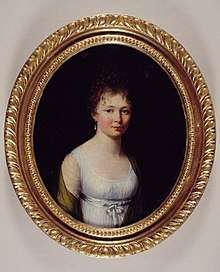Victor Marie du Pont
Victor Marie du Pont de Nemours (October 1, 1767 – January 30, 1827) was a French American diplomat, politician and businessman. He was a member of the Delaware General Assembly, the founder of the Du Pont, Bauduy & Co., wool manufacturers, and brother of Éleuthère Irénée du Pont, the founder of the E.I. du Pont de Nemours Company.
Victor Marie du Pont | |
|---|---|
.jpg) | |
| Born | Victor Marie du Pont de Nemours October 1, 1767 Paris, France |
| Died | January 30, 1827 (aged 59) Philadelphia, Pennsylvania |
| Occupation | diplomat businessman politician |
| Spouse(s) | Gabrielle Joséphine de la Fite de Pelleport |
| Children | Charles I. du Pont Samuel Francis du Pont |
Early life and family

Victor du Pont was born October 1, 1767 in Paris, France, son of Pierre Samuel du Pont de Nemours and Nicole Charlotte Marie Louise le Dée. He married Gabrielle Joséphine de la Fite de Pelleport in 1794 and had five children, Amélie-Élisabeth (1796–1869), Samuel Francis (born and died 1799), Charles Irénée (1803–1865), Samuel Francis (1803–1865) and Julia Sophie (1806–1882).
Professional career
After 1784 du Pont worked with his father in King Louis XVI's Bureau of Commerce. There he had opportunities to travel around Europe and meet visiting friends of his father. In 1788 he began four years of work with the French minister to the United States in both New York City and Philadelphia. During this time, he wrote letters to his father analyzing the U.S. Constitution and the prospects for its ratification. Returning to Paris in 1793, he married and soon went back to the United States, this time as French Consul at Charleston, South Carolina. He remained there until 1797 when he was named French Consul-General at Philadelphia, but being refused recognition by President John Adams, he returned to France.
For the next two years Victor du Pont assisted his father in his preparation for the whole family immigrating to the United States. They finally sailed on the American Eagle, arriving in Newport, Rhode Island, January 1, 1800. From there the father, two brothers, and wives and children, went to live at Goodstay, a house purchased for them in Bergen Point, New Jersey. Many ideas for future du Pont businesses were conceived in the coming year at Goodstay, including the one that had his brother, Eleuthère, beginning a gunpowder business. Victor and his brother returned to France for a year in 1801 to seek investors for that and various other prospects. He returned to New York, established a trading company, Victor du Pont de Nemours & Co., and acted as an agent for Louis Pichon, the French Consul-General and chargé d'affairs, provisioning French troops seeking to quell the rebellion then going on in Santo Domingo. This firm went into bankruptcy in 1808, as his many advances, including those to the French government, went unreimbursed. Victor next tried his hand at farming and merchandising on the Genesee River valley of western New York.
In 1811, he moved with his family to Delaware and established residence at Louviers on the Brandywine Creek, across from the Eleutherian Mills of his brother. He established a woolen mill to manufacture cotton cloth. Eleuthère's partner, Pierre Bauduy and son-law-law, Ferdinand Bauduy, joined the business in 1813, and it became known as Du Pont, Bauduy & Co. Soon after arriving in Delaware, Victor du Pont was elected to one of the New Castle County seats in the State House for the 1815, 1816, and 1817 sessions and later was elected to the State Senate for the 1821, 1822, and 1823 sessions.
Death and legacy
Victor du Pont died in Philadelphia on January 30, 1827, and is buried in the du Pont family cemetery near Greenville, Delaware. Victor du Pont was a man "whose friends were everywhere." His son Charles took over management of the wool manufacturing business upon his death, and his other son, Samuel Francis, was a Rear Admiral in the U.S. Navy during the Civil War.
See also
References
- Dutton, William S. (1942). Du Pont, One Hundred and Forty Years. New York: Charles Scribner's Sons.
External links
Places with more information
- Hagley Museum and Library website Barley Mill Road, Wilmington, Delaware (302) 658–2400.
- University of Delaware Library website, 181 South College Avenue, Newark, Delaware 19717; (302) 831–2965
- Delaware Historical Society website; 505 North Market Street, Wilmington, Delaware 19801; (302) 655-7161